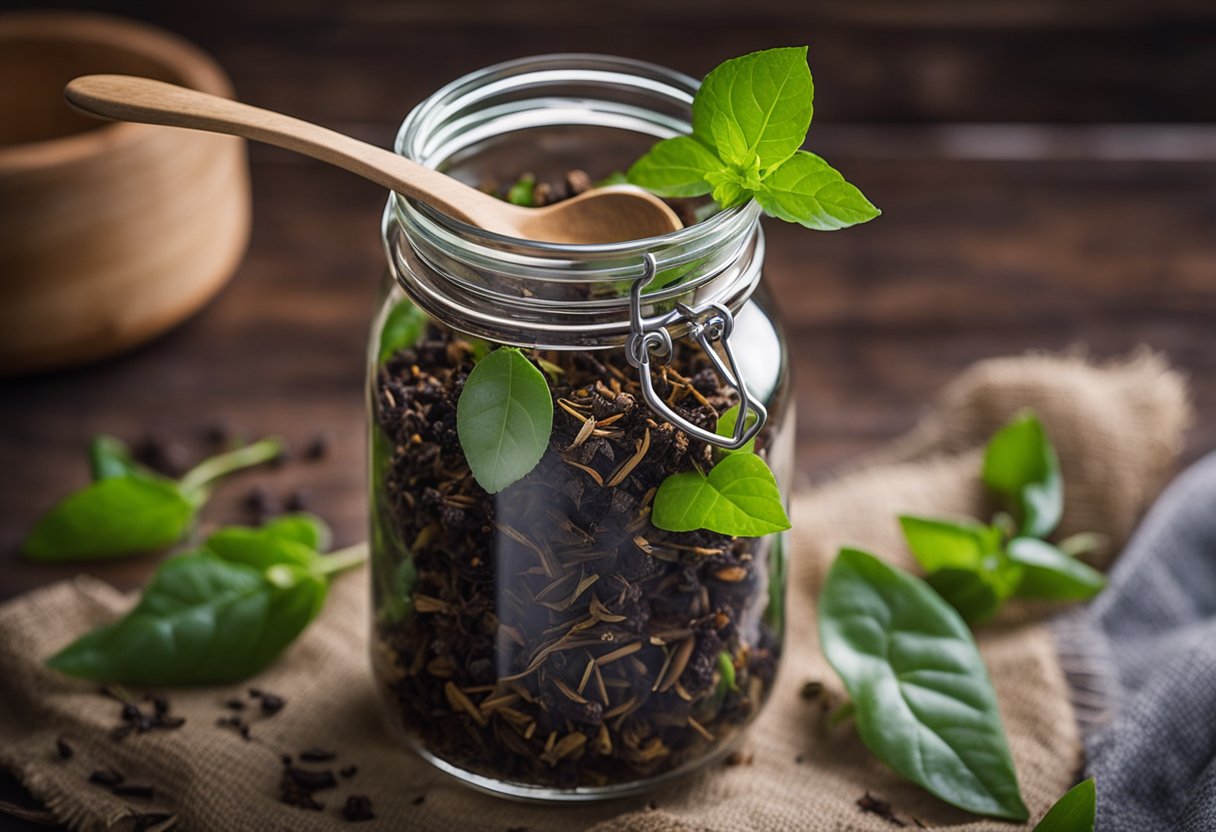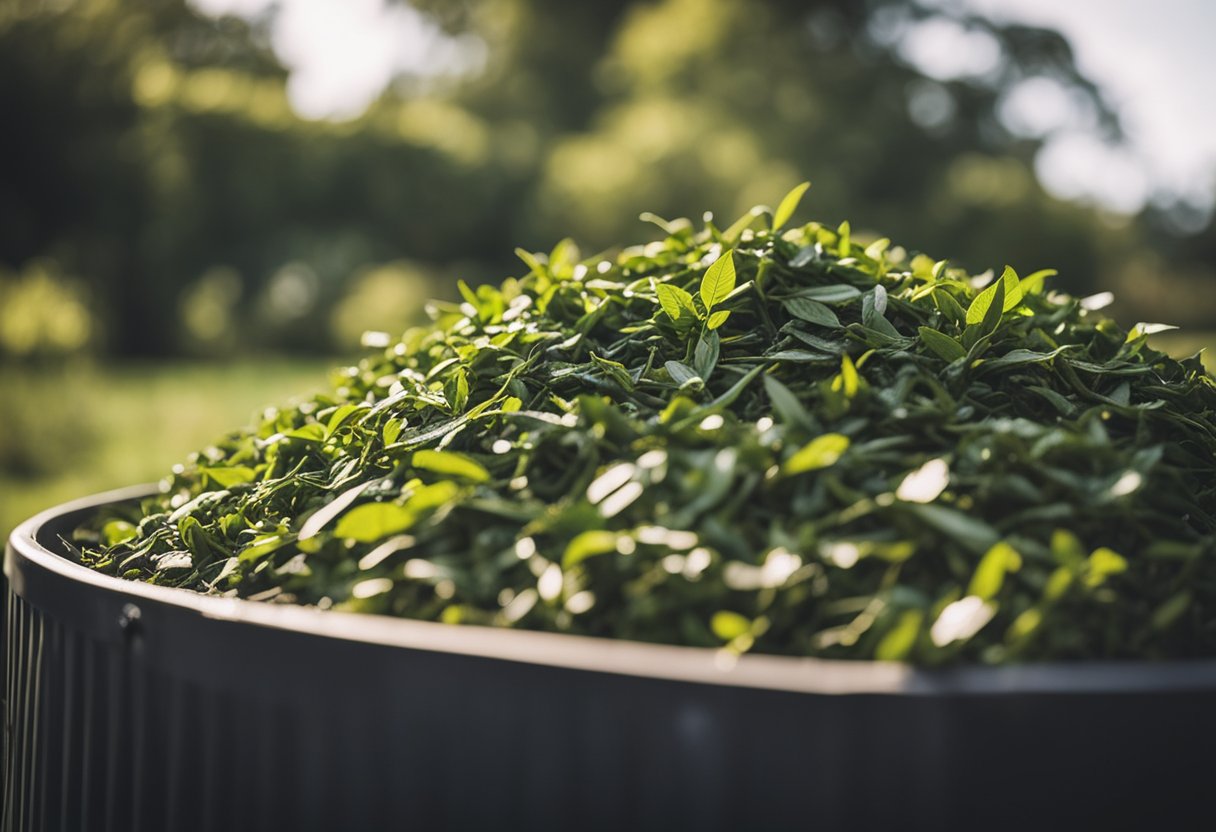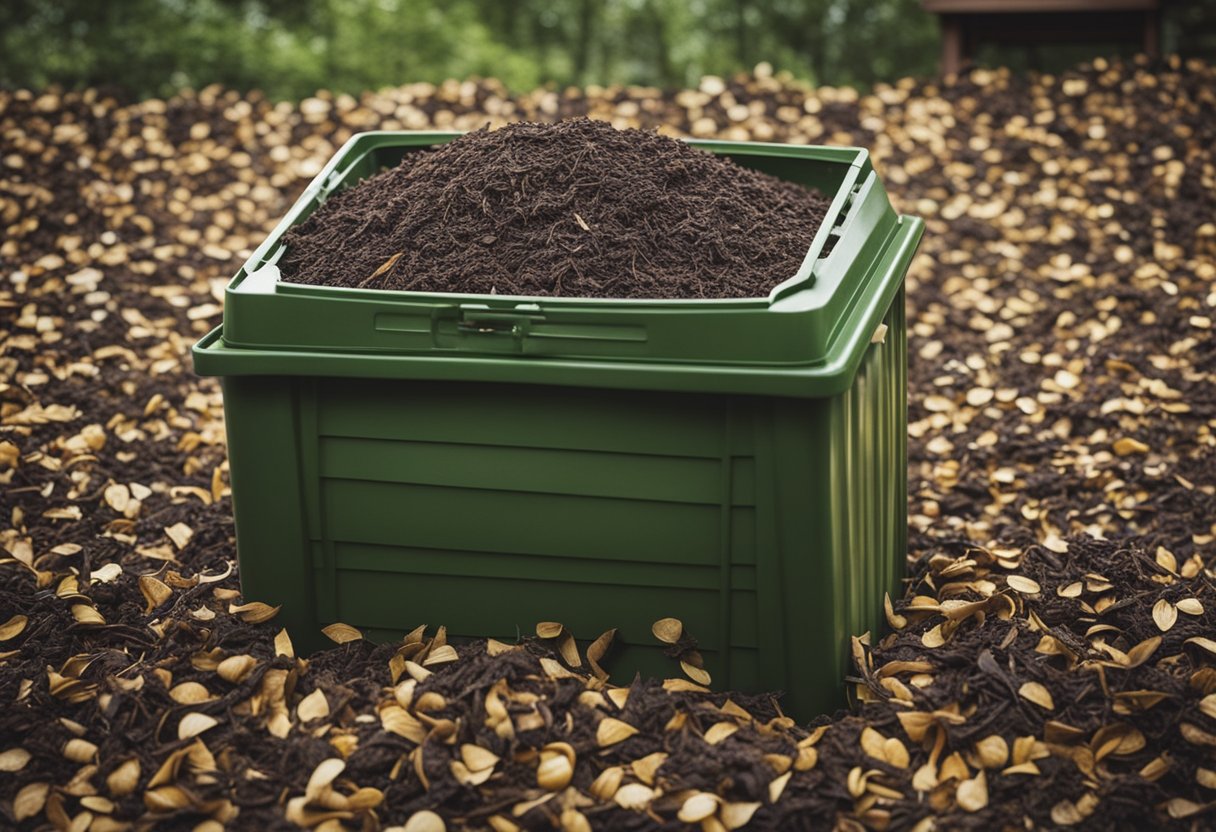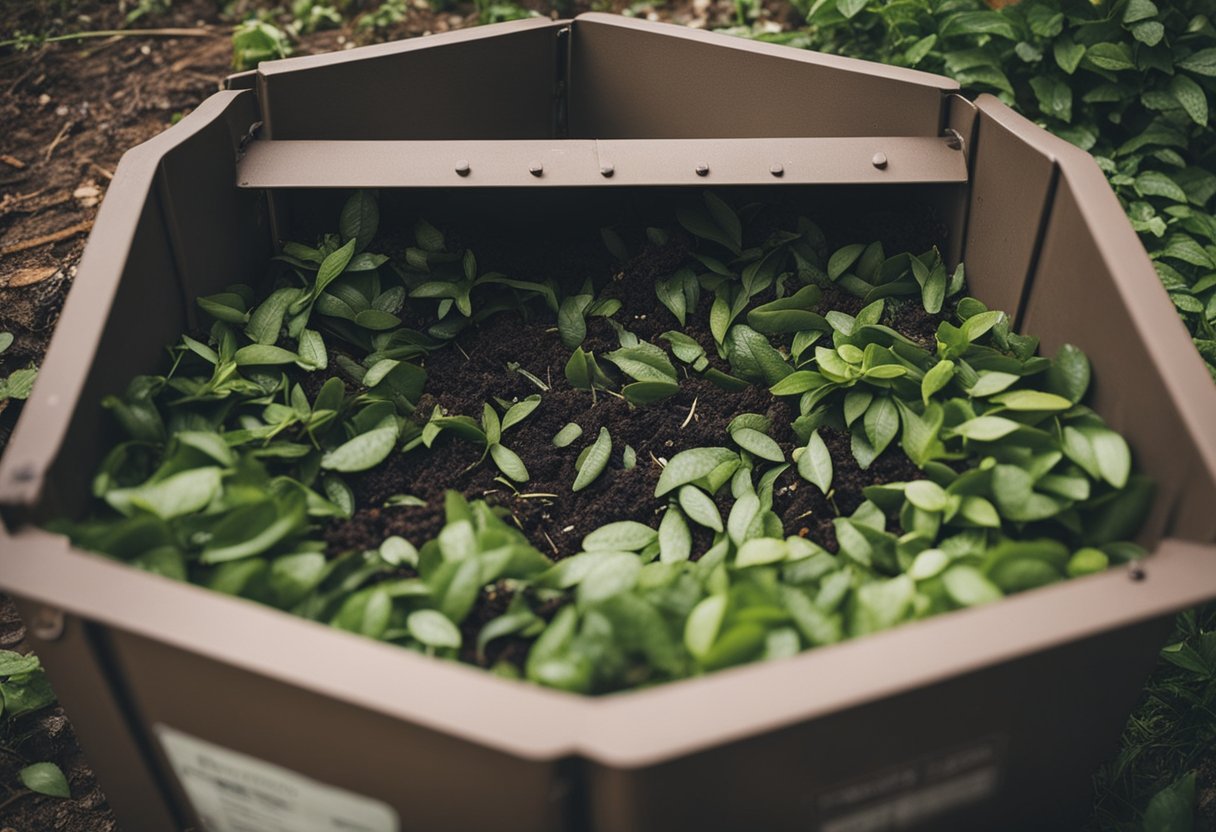As an Amazon Associate I earn from qualifying purchases.
At A Glance
Yes, you can compost tea leaves. Tea leaves are an excellent addition to your compost pile as they are rich in nutrients and organic matter. They fall under the “green” compost material category, providing the necessary nitrogen to help break down the “brown” materials like leaves and twigs. If the tea leaves come in a tea bag, ensure that the tea bag is compostable as well, since some tea bags contain plastic. It’s advisable to tear open the bags and compost only the tea leaves if you’re unsure about the compostability of the tea bags
Composting is an eco-friendly method of disposing of organic waste. It involves breaking down organic materials into nutrient-rich compost that can be used to fertilize soil and plants. While many people compost food scraps, yard waste, and other organic materials, some may be wondering if tea leaves can be added to a compost pile.

The good news is that tea leaves can be composted! In fact, composting tea leaves is an excellent way to reduce waste and provide nutrients to your soil. Tea leaves are considered a “green” material, meaning they are high in nitrogen, which is essential for plant growth. When added to a compost pile, tea leaves can help speed up the decomposition process and create a nutrient-rich compost that can be used to fertilize your garden.
However, it’s important to note that not all tea bags are compostable. Some tea bags contain plastic or other synthetic materials that cannot be broken down in a compost pile. If you’re unsure whether your tea bags are compostable, check the packaging or contact the manufacturer. Additionally, tea leaves should be added to a compost pile in moderation, as too many tea leaves can create a dense, wet pile that may not decompose properly.
Understanding Compost

Composting is a natural process of recycling organic material into nutrient-rich soil. It is an excellent way to reduce waste and create a sustainable garden. The composting process involves microorganisms breaking down carbon-rich materials, such as leaves, grass clippings, and food scraps, into a usable soil amendment.
The decomposition process is essential in creating compost. It is a complex process that requires the right balance of materials, moisture, temperature, and oxygen levels. The microorganisms responsible for decomposition require oxygen to break down the organic material.
Carbon-rich materials, such as leaves and twigs, provide the energy source for microorganisms. Nitrogen-rich materials, such as food scraps and grass clippings, provide the protein source. A good balance of both carbon and nitrogen-rich materials is essential for successful composting.
Maintaining proper moisture levels is also crucial for composting. The compost pile should be kept moist, but not too wet. Too much moisture can lead to anaerobic conditions, resulting in an unpleasant odor and slow decomposition. Aeration is also essential for composting. Turning the compost pile regularly helps distribute air and moisture, aiding the decomposition process.
Composting is an excellent way to recycle biodegradable waste and reduce the amount of organic material sent to landfills. The end result is nutrient-rich soil that improves soil structure, aeration, and water-holding capacity.
The Role of Tea Leaves in Composting

Composting tea leaves is a great way to reduce waste and provide your garden with nutrient-rich soil. As a tea lover, I always have leftover tea leaves and tea bags, and composting them is an excellent way to reuse them.
Tea leaves contain essential nutrients like nitrogen and trace minerals that plants need to thrive. When you compost tea leaves, you’re introducing these nutrients back into the soil, enriching it, and promoting healthy plant growth.
However, it’s important to note that not all teas are created equal. Some teas, like herbal teas, may not be suitable for composting because they don’t contain the same nutrients as traditional tea made from the Camellia sinensis plant.
Tannins are a compound found in tea leaves that can affect the composting process. Tannic acid is a specific type of tannin that can slow down the decomposition of organic matter. While tannins can be beneficial to plants in small amounts, too much can be harmful.
Caffeine is another compound found in tea leaves. While caffeine is not harmful to plants, it’s important to note that it doesn’t break down during the composting process. This means that if you add too much tea to your compost, you may end up with caffeine in your soil.
When composting tea leaves, it’s best to use loose leaf tea rather than tea bags. Tea bags can contain plastics or other materials that don’t break down during the composting process and can be harmful to plants.
Overall, composting tea leaves is an excellent way to reduce waste and provide your garden with nutrient-rich soil. Just be mindful of the type of tea you’re using and the amount you’re adding to your compost.
Composting Methods

When it comes to composting tea leaves, there are several methods you can use, depending on your circumstances and preferences. In this section, I will go over some of the most popular methods for composting tea leaves.
Outdoor Composting
One of the most common methods for composting tea leaves is to add them to an outdoor compost pile or bin. Tea leaves are considered a “green” material, meaning they are high in nitrogen, which is essential for the composting process. To ensure that your compost pile is balanced, you should also add “brown” materials, such as leaves, paper, and small branches.
To compost tea leaves outdoors, simply add them to your compost pile or bin along with other compostable materials. Be sure to turn the compost occasionally to distribute air and moisture, which will help speed up the decomposition process.
Indoor Composting
If you don’t have access to an outdoor compost pile or bin, you can still compost tea leaves indoors. There are several indoor composting systems available, such as worm bins or compost tumblers, that allow you to compost your kitchen waste without having to go outside.
When composting tea leaves indoors, it’s important to use compostable or biodegradable materials, such as polypropylene or compostable bags. Avoid using tea bags made from non-compostable materials, such as nylon or other synthetic materials.
Composting with Tea Bags
If you prefer to use tea bags to brew your tea, you can still compost them along with the tea leaves. However, it’s important to use compostable tea bags, which are made from natural materials that will break down in the compost pile.
The Republic of Tea offers a line of compostable tea bags that are made from a blend of natural fibers, such as abaca and paper, that are free of polypropylene and other synthetic materials. These tea bags are designed to break down quickly in the compost pile, leaving behind nutrient-rich compost that can be used to fertilize your garden.
Vermicomposting Tea Leaves
Another option for composting tea leaves is to use vermicomposting, which is the process of composting with earthworms. Earthworms are excellent at breaking down organic matter, and they can help speed up the composting process.
To vermicompost tea leaves, simply add them to your worm bin along with other compostable materials. Be sure to avoid adding tea bags made from synthetic materials, as these can harm the earthworms.
In conclusion, there are several methods for composting tea leaves, including outdoor composting, indoor composting, composting with tea bags, and vermicomposting. By composting your tea leaves, you can reduce your environmental impact and create nutrient-rich compost that can be used to fertilize your garden.
Benefits of Composting Tea Leaves
Composting tea leaves is a great way to reduce food waste and create a nutrient-rich soil amendment for your garden. Tea leaves are an excellent source of nitrogen, which is an essential nutrient for plant growth. Nitrogen is a key component of chlorophyll, which is responsible for photosynthesis in plants. By adding tea leaves to your compost pile, you can increase the nitrogen content of your compost and provide your plants with the nutrients they need to thrive.
In addition to nitrogen, tea leaves also contain other important nutrients such as phosphorus and potassium. These nutrients are essential for healthy plant growth and can help improve the overall health of your garden. Composting tea leaves can also help improve the water-holding capacity of your soil, which can be especially important in areas with dry climates.
Composting tea leaves can also help reduce the amount of food waste that ends up in landfills. When food waste decomposes in landfills, it produces methane gas, which is a potent greenhouse gas that contributes to climate change. By composting tea leaves and other food waste, you can help reduce the amount of methane gas that is produced and contribute to a more sustainable future.
Another benefit of composting tea leaves is that it can help improve the structure of your soil. When you add compost to your soil, it helps to improve its texture and structure, which can make it easier for plants to grow. Composting tea leaves can also help improve the oxygen content of your soil, which can be beneficial for the growth of beneficial microorganisms.
Overall, composting tea leaves is a simple and effective way to improve the health of your garden and reduce your environmental impact. By adding tea leaves to your compost pile, you can create a nutrient-rich soil amendment that will help your plants grow strong and healthy.
Potential Issues with Composting Tea Leaves
When composting tea leaves, there are a few potential issues that you should keep in mind.
Moisture
Tea leaves are high in moisture, which can make your compost pile too wet. This can slow down the composting process and create an environment that is conducive to anaerobic bacteria, which can create unpleasant odors. To avoid this issue, make sure to balance your compost pile with enough dry “brown” materials, such as dried leaves or straw.
Caffeine Risk
Tea leaves contain caffeine, which can be harmful to some plants. If you’re composting tea leaves, it’s important to monitor the caffeine levels in your compost. If you notice any negative effects on your plants, you may want to consider reducing the amount of tea leaves you add to your compost.
Odor
Composting tea leaves can create a strong, unpleasant odor. This is especially true if you’re composting tea bags that contain synthetic materials. To reduce odor, make sure to turn your compost pile regularly and add enough “brown” materials to balance out the nitrogen-rich tea leaves.
Pests and Insects
Tea leaves can attract pests and insects, such as fruit flies and ants. To avoid this issue, make sure to bury your tea leaves deep within your compost pile and cover them with other materials.
Overwatering and Root Rot
If you add too many tea leaves to your compost pile, you may end up with a pile that is too wet. This can lead to overwatering and root rot in your plants. To avoid this issue, make sure to balance your compost pile with enough dry “brown” materials.
Pesticides
If you’re composting tea leaves that were grown with pesticides, those pesticides can end up in your compost. To avoid this issue, make sure to use organic tea leaves for composting.
Meat and Fish
Tea leaves should not be composted with meat or fish scraps, as this can create an unpleasant odor and attract pests. Instead, compost tea leaves with other plant-based materials.
Using Composted Tea Leaves
I love composting my used tea leaves because it’s an easy way to reduce waste and give my garden a boost. Composting tea leaves is an excellent way to add nutrients to your soil and improve the overall health of your plants.
When composting tea leaves, it’s important to remember that they are considered a “green” material, which means they are rich in nitrogen. To balance out your compost, you’ll need to add some “brown” materials as well, such as dried leaves, yard trimmings, or shredded newspaper.
Once you’ve added your tea leaves to the compost pile, they will break down over time and become a rich, nutrient-dense fertilizer. You can then use this compost to feed your plants, mulch your garden beds, or even improve the health of your lawn.
Tea leaves are particularly beneficial for acid-loving plants, such as herbs, chamomile, and rose bushes. They can also be used to fertilize cacti and Boston ivy, which prefer a slightly acidic soil.
When composting tea leaves, it’s important to pay attention to the pH levels of your soil. If your soil is already acidic, adding too many tea leaves to your compost could make it too acidic and harm your plants. On the other hand, if your soil is alkaline, adding tea leaves to your compost can help balance out the pH levels.
Overall, composting tea leaves is a great way to reduce waste and improve the health of your garden. Just remember to balance out your compost with “brown” materials, pay attention to your soil’s pH levels, and enjoy the benefits of a nutrient-rich fertilizer.
